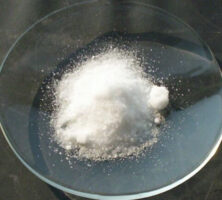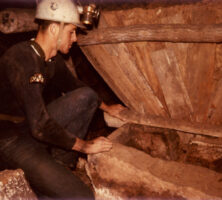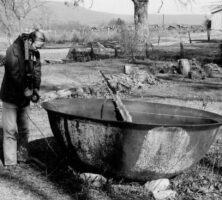When mixed in proper proportions with sulfur and charcoal, saltpeter—or potassium nitrate—forms gunpowder. The ability of early colonists to procure their own supplies of this essential substance enabled them to successfully fight the Revolutionary War (1775-83) despite blockades by England. As did the Confederates during the Civil War (1861-65), the colonists depended on a secure source of gunpowder, and Georgia proved to be an important producer.

Caves within the Appalachian Mountains were the most significant source of saltpeter. Earth from the caves was mined and carried in bags or wheelbarrows to be processed either outside or, in many instances, inside the cave. Large wooden hoppers, or vats, were constructed to hold the excavated soil. Water was then poured in and allowed to stand for several days to take into solution the nitrates present in the soil, which was stirred often with wooden paddles. The water would then be collected by troughs at the base of the hoppers.
This aqueous solution was next boiled in large cast-iron kettles to extract the mineral, a process known as lixiviation. Since the nitrate obtained was actually calcium nitrate, wood ash was added during the lixiviation to convert the substance into potassium nitrate. Once the water boiled off, the remaining precipitate was bagged and transported to gunpowder factories, such as the Confederate Powder Works in Augusta.

The work of the “peter monkeys,” as the miners were known, was an extremely tiring and dangerous task. Laboring for long hours in the cold and dark environment of a cave, dimly lit with torches that gave off noxious smoke, the workers often crawled into small passages to extract the earth. They also felled many trees to provide wood for the hoppers and to fuel the fires used for boiling. If the processing was done within the cave, all of this material was carried underground. If a water source was not readily available, logs were hollowed out to provide piping for its transport. Wages were low, and often either enslaved laborers or conscripted soldiers were employed in the operation.
Several caves in Georgia served as mines for saltpeter. The most prominent was Kingston Saltpeter Cave in Bartow County. The cave was located far enough south of advancing Union forces in 1864 that, while other saltpeter operations farther north had been overtaken, Kingston survived until late May. Mined for nitrates as early as 1804, Kingston was a privately owned site at the outbreak of the Civil War but was taken over by the Confederate Nitre Bureau in order to increase production. While none of the saltpeter works are in evidence there today, records attest to the large quantity of material processed from the cave before its destruction by the Union army.










